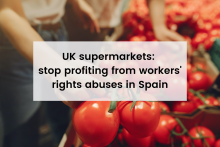Lee este artículo en español / read this article in Spanish.
One year ago, we published the report Produce of Exploitation, UK Supermarkets and Migrant Labour in Southern Spain, which revealed rampant labour exploitation in UK supermarkets' fruit and vegetable supply chains.
It showed that migrant workers in Spain, who pick produce for UK supermarkets, routinely face abuses including underpayment, harassment, and dangerous and unsafe working conditions.
One worker, Maria, told us "Lots of people want to speak out, but they are afraid". Those who speak out risk of being harassed, fired, and even deported.
The report received worldwide press attention, and brought all UK supermarkets to the table for the first time to discuss the issues with us, including the reports' findings and recommendations.
Supermarket-led initiatives have proven ineffective
Our report made clear the failures of multi-stakeholder initiatives and voluntary corporate commitments to protect workers’ rights. For decades these have failed to address the issues workers face.
Our research showed that UK supermarkets have many codes of conduct and a range of voluntary commitments and certifications. Yet none of them has substantially improved conditions for workers, and often such superficial remedies prevent the adoption of more effective models.
What were the report's recommendations?
The report recommended that UK supermarkets publish all supplier names to the farm level in southern Spain (a step which no supermarket has yet taken).
But the report’s principal recommendation was the exploration of Worker-driven Social Responsibility (WSR) as a model that has “been successful in addressing insidious rights violations” in other industries where abuses are widespread.
It's a recommendation that only workers can progress, and we're very pleased to have secured funding with a range of inspiring partners to make this happen. The securing of funding to explore WSR represents a major step forward in implementing this key recommendation of the report.







